On the penultimate day of the Confederate Heritage Month he proclaimed for the second year in a row, Mississippi Gov. Tate Reeves made a bold declaration: “There is not systemic racism in America.”
The announcement, if it were true, could come as a relief to the 38% of Mississippians who are Black. But around 16% of those residents will not have the opportunity to express their gratitude to the governor in the next election because they are systematically disenfranchised due to an 1890 Jim Crow felony voting law.
The Cambridge Dictionary defines “systemic racism” as “policies and practices that exist throughout a whole society or organization, and that result in and support a continued unfair advantage to some people and unfair or harmful treatment of others based on race.”

Like most of America, such racist policies and practices persist in everything from housing and mortgages, to access to banks, to education, to higher education, to criminal justice, to policing, to running water, to health care, to environmental hazards, to farming, to food security and more in Mississippi.
A Capital City Without Water
The governor made his remarks during a Fox News town hall hosted by Laura Ingraham a day after U.S. Sen. Tim Scott, a Black Republican, offered a response to President Joe Biden’s April 28 joint address to Congress by declaring that “America is not a racist nation.”
Reeves’ declaration that systemic racism does not exist in the country also came on the heels of a breakdown in the capital city’s water system, which left residents of the 80%-Black city without drinkable running water for a month between February and March.
Jackson is a city where potholes go unfilled as state leaders, decade after decade, have refused to invest in the city’s crumbling infrastructure—a decline that began after white residents abandoned the city en masse for nearby suburbs following public school integration.
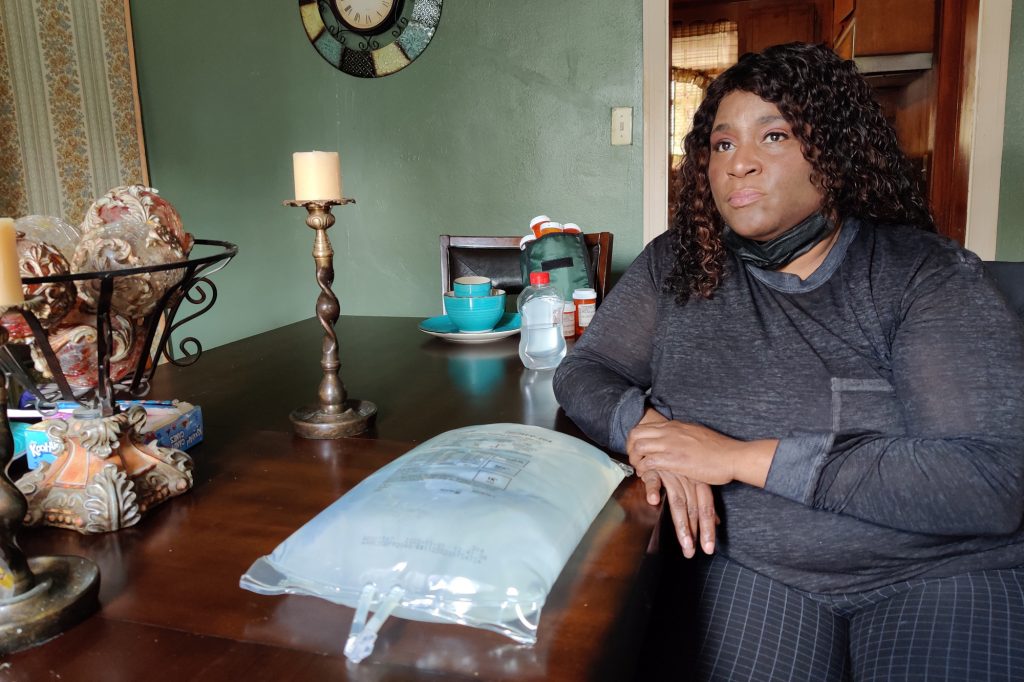
But with few improvements, many who can afford to move have left the city, further shrinking the tax base and leaving poorer, mostly Black Jacksonians with fewer opportunities and the city with less funding. The effects of decades of systemic racism are evident in Jackson, including the legacy of 1930s redlining, which effectively barred residents in Black parts of the city from obtaining home loans; those neighborhoods still have, on average, lower economic prospects as a result.
Such factors contribute to the fact that Black Mississippians have almost three times the poverty rate of the state’s white residents. White leaders and Black leaders alike often argue that the way out of poverty is through education. But the state’s funding scheme for public schools can perpetuate the cycle, since a significant portion of public-school funding relies on the local tax base. In poorer neighborhoods, like the community in Jackson where Raines Elementary is located, the disparities can prove stark.
‘Mississippi Continues to Operate Two Types of Schools’
“At Raines Elementary, which is more than 99 percent African-American, the paint is peeling off the walls, water spots are visible on the ceilings, and lunches sometimes have curdled milk and rotten fruit,” the Southern Poverty Law Center wrote in 2017. “Plaintiff Precious Hughes describes the school as ‘old, dark and gloomy—like a jail.’”
Since 2017, the state has argued in federal court that Black residents represented by the SPLC cannot sue to force the state to ensure that children in predominantly Black schools have the same quality and opportunities as children in predominantly white schools. Earlier in April, the U.S. Supreme Court rejected a request by Attorney General Lynn Fitch, a white Republican, to have the case dismissed.

In its complaint, the SPLC noted immense disparities, with the plaintiffs’ Black children attending schools that “lack textbooks, literature, basic supplies, experienced teachers, sports and other extracurricular activities, tutoring programs, and even toilet paper.”
“Today, 80 percent of Mississippi’s highest-performing school districts are majority-white, and all of its failing school districts are majority-Black,” the SPLC said in a December 2018 statement. “More than 100 years since Reconstruction and 66 years after Brown v. Board, Mississippi continues to operate two types of schools: high-performing schools for white children and failing schools for Black children.”
The lawsuit, Williams v. Reeves, bears Gov. Reeves’ name. It notes that only 11% of students at the low-income plaintiffs’ children’s predominantly Black public schools were proficient in reading; but at three wealthier, majority-white schools in Madison County, DeSoto County and Gulfport, 65% of children were proficient in reading.
As lieutenant governor, when he presided as president of the Mississippi Senate, Reeves often faced criticism for failing to significantly boost funding for education, even as he pushed for state income tax cuts that disproportionately benefited corporations and wealthier residents. He controversially supported additional bonus pay for teachers in higher-performing schools to reward them.
The governor has long championed what he called “school choice” policies, opening charter schools as alternatives to the state’s underfunded public schools and moving millions of dollars from the public education fund into vouchers for private school tuition.
The white operators of a private school that was among the voucher program’s top recipients, New Summit School, allowed Reeves to film an ad touting support for public education in 2019. (They now face multiple felony charges for allegedly “conspiring” to “fraudulently” obtain millions in public education dollars for their private schools).
But when the SPLC first announced the lawsuit over racial disparities in education in 2017, Gov. Reeves denounced it, saying it would “force us to waste millions of tax dollars on lawsuits that could be spent in our classrooms.” He also criticized the SPLC for suing the state over its fledgling charter school program.
“The irony of a fringe organization that is already suing the state to protect the status quo in opposition to providing school choices to minority students while now simultaneously suing the state based on the fact those same failing districts aren’t adequately educating those same minority students is almost laughable,” The Clarion-Ledger reported the governor saying at the time.
‘To Secure Permanent White Rule’
The disparities in education continue despite the fact that Mississippi enshrined a vow to operate a “uniform system of free public schools” in its 1869 constitution—a key provision that allowed for its readmittance to the Union as a state after the Civil War.
For a brief period during the Reconstruction era, newly emancipated Black Mississippians made enormous gains as Black men, like white ones, gained the right to vote. Mississippi sent the first and second Black men to serve in the U.S. Senate in the nation’s history, respectively, Sens. Hiram Revels and Blanche K. Bruce.
But in 1890, white Mississippi lawmakers began drafting a new Constitution riddled with Jim Crow laws to override the one that, in 1869, had allowed its re-entry to the Union, partly on the promise of equal public education. The new system instituted an explicitly white supremacist regime, with its drafters bent on disenfranchising, criminalizing and denying opportunity to the state’s Black residents.
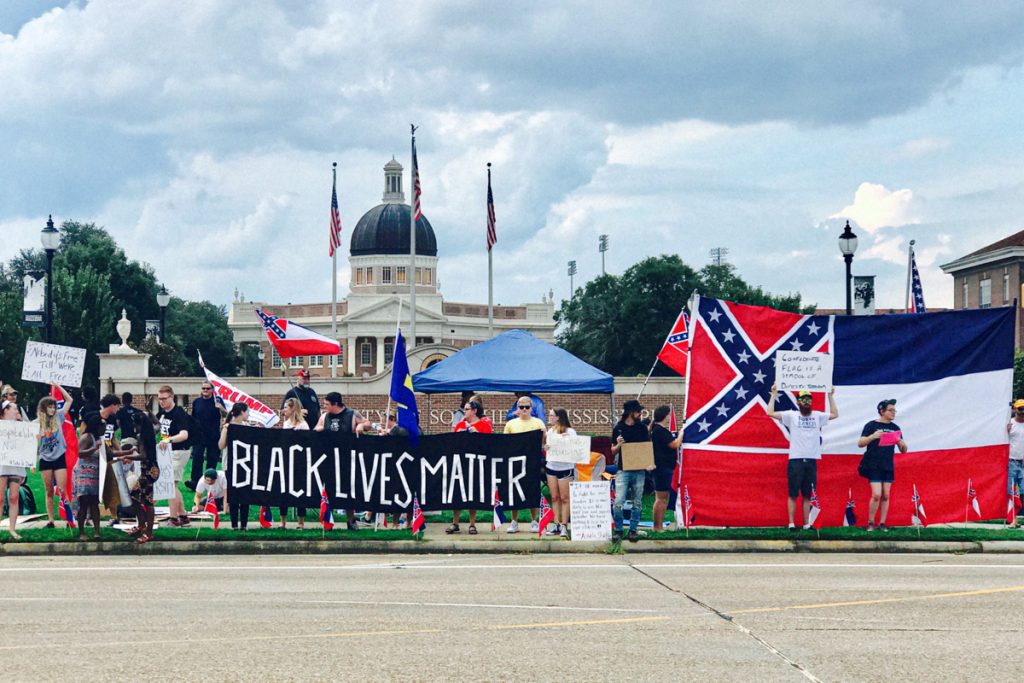
The provisions to effectively outlaw Black voting included poll taxes and literacy tests, which, in tandem with ensuring Black children had far inferior education opportunities than white ones, allowed white registrars the veneer of a racially agnostic excuse to refuse to deny Black registrants’ voter applications. In early April, Mississippi Secretary of State Michael Watson, a white Republican, drew comparisons to those Jim Crow laws after he defended voter restrictions in Georgia and criticized the idea of implementing automatic voter registration.
“So think about all those woke college and university students now who will automatically be registered to vote whether they wanted to or not. … You’ve got an uninformed citizen who may not be prepared and ready to vote. Automatically, it’s forced on them: ‘Hey, go make a choice.’ And our country’s going to pay for those choices,” Watson said, as first reported by the Mississippi Free Press.
“Woke” is a term that originated in Black culture to describe someone who has become aware of the reality of systemic racism and structural inequality in American society. In an op-ed for the Mississippi Free Press, former Gov. Ray Mabus, a white Democrat, called the remarks “a throwback to the awful time of Jim Crow” when “Black Americans were systematically, ruthlessly, and often violently kept from voting to ensure the preservation of segregation and white supremacy.”
The legislative committee that drafted Mississippi’s 1890 Constitution was initially explicit in that goal. They adopted a resolution declaring that “it is the duty of this Com. to perform its work in such a manner as to secure permanent white rule in all departments of state government and without due violence to the true principles of our republican system of government.”
They later revised the resolution, changing “white rule” to “intelligent rule.” Contrary to popular misconception, Jim Crow laws usually masqueraded as colorblind. But the drafters of that constitution were not coy as they spoke on the floor.
“I will agree that this is a government by the people and for the people, but what people? When this declaration was made by our forefathers, it was for the Anglo-Saxon people. That is what we are here for today—to secure the supremacy of the white race,” Franklin County delegate J.H. McGehee said to applause from his fellow lawmakers at the 1890 convention as he vowed to strip voting rights from Black residents “even if it does sacrifice some of my white children, or my white neighbors or their children.”
The Great White Chief
After the state adopted that law as part of its constitution, along with other provisions like poll taxes and literacy tests, James K. Vardaman, one of its drafters, explained the goal: “There is no use to equivocate or lie about the matter … Mississippi’s constitutional convention of 1890 was held for no other purpose than to eliminate the n–ger from politics. Not the ‘ignorant and vicious’, as some of the apologists would have you believe, but the n–ger.”
Voters elected Vardaman as governor, and supporters hailed him as Mississippi’s “Great White Chief.”
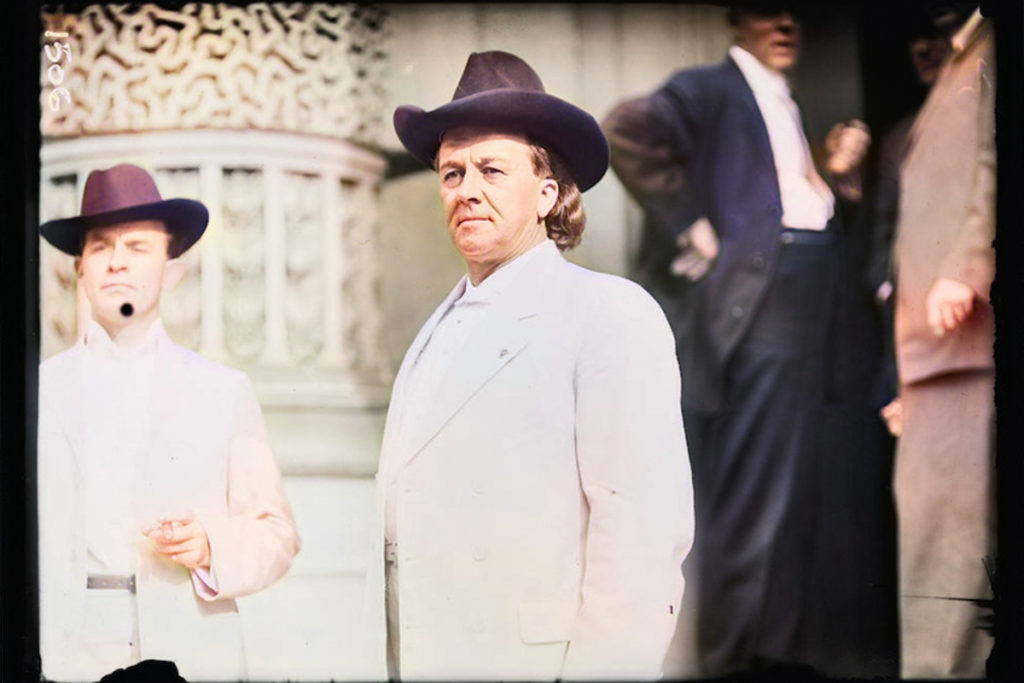
“He did not support public education for African Americans beyond the most basic moral instruction and vocational training because he believed that they should remain in economic servitude and that education was unnecessary for the kind of work they would do,” historian David Sansing wrote for the Mississippi Encyclopedia. “He recommended the closing of black public schools; vetoed state funding for Mississippi Normal Institute, a college for African American teachers; and urged the repeal of the Fourteenth and Fifteenth Amendments, which gave African Americans the right to vote and hold office.”
In 1904, the racist governor also led the effort to make Parchman Farm, an all-Black prison modeled after an Old South slave plantation, the state’s central prison. He said it could be used to keep “criminal negroes” who wanted “to live without honest toil” from moving to cities across the state and threatening “the safety of the white man’s home.” Parchman’s inmate population is still majority Black today and the prison is infamous for its poor living conditions and deadly violence.
‘Two Enemies: The Anti-War Left and Black People’
Jim Crow laws helped tar Black men in the state with felonies which, in turn, helped keep them out of the voting booth after their release. But even after the 1964 Civil Rights Act and the 1965 Voting Rights Act ended Jim Crow provisions such as poll taxes and literacy tests, felony disenfranchisement endured in Mississippi and in other states across the country.
State and federal leaders found ways to implement new criminal statutes that would disproportionately target Black men, as Michelle Alexander explained in her 2010 book, “The New Jim Crow: Mass Incarceration in the Age of Colorblindness.”
In 1968, at a time when many of the most overtly racist politicians in the country were members of the Democratic Party, such as U.S. Sen. James Eastland of Mississippi, Republican Richard Nixon ran for president while dog whistling to white voters about rising crime—with an emphasis on Black crime.
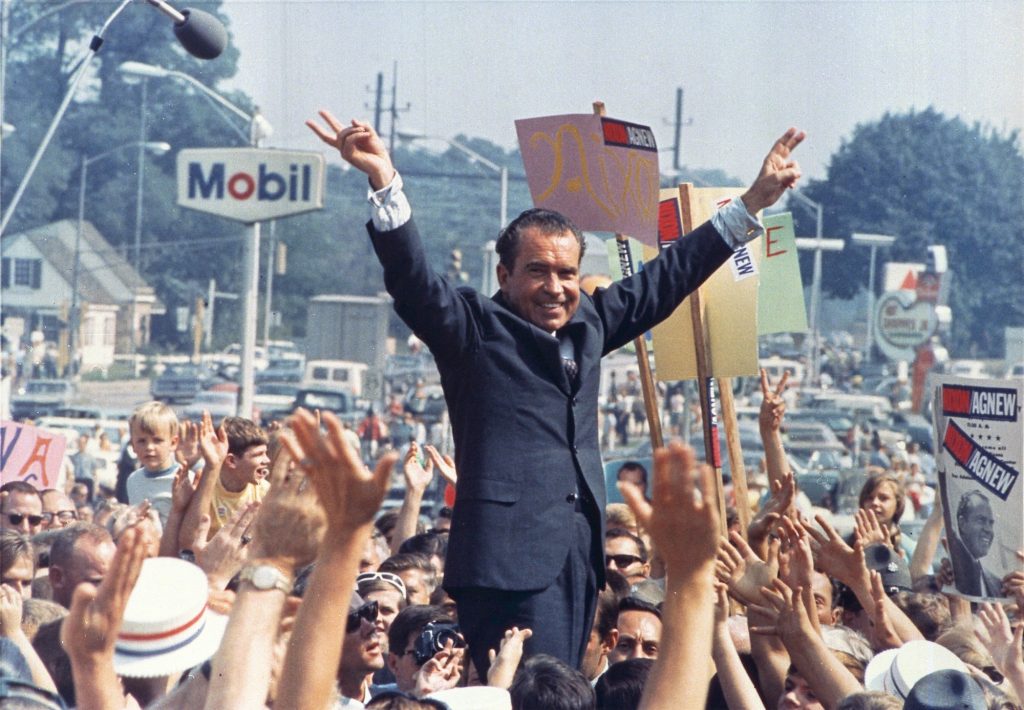
“Nixon’s successful presidential election campaign could point the way toward long-term political realignment and the building of a new Republican majority, if Republicans continued to campaign primarily on the basis of racial issues, using coded antiblack rhetoric,” Republican Strategist Kevin Phillips wrote in “The New Republican Majority” in 1969.
Two years later, in 1971, President Nixon declared a “War on Drugs” in a special message to Congress, launching a mass federal law enforcement operation that, in the decades since, has wreaked havoc nationwide and resulted in skyrocketing incarceration—especially among poor and Black communities.
In 1994, one of Nixon’s domestic policy advisers and Watergate co-conspirators, John Ehrlichman, told Dan Baum that race was part of the motivation behind Nixon’s anti-drug campaign.
“The Nixon campaign in 1968, and the Nixon White House after that, had two enemies: the antiwar left and black people. You understand what I’m saying?,” Baum reported Ehrlichman saying in Harper’s Magazine. “We knew we couldn’t make it illegal to be either against the war or black, but by getting the public to associate the hippies with marijuana and blacks with heroin, and then criminalizing both heavily, we could disrupt those communities. We could arrest their leaders, raid their homes, break up their meetings, and vilify them night after night on the evening news. Did we know we were lying about the drugs? Of course we did.”
The anti-crime fervor continued throughout the ’70s, ’80s and ’90s, with the federal government and states, including Mississippi, passing “tough-on-crime” laws that increased incarceration rates dramatically. Mississippi’s prison population was 8,158 in 1990.
Law Bars 130,000 Black Residents From Voting
After lawmakers passed a major crime bill in 1995 that created three-strikes laws and toughened parole eligibility, the state prison population soared to over 18,000 by the year 2000—a figure that has changed little since despite some mild reforms in recent years. Currently, Black Mississippians make up about 64% of the state prison population despite only accounting for 38% of the overall population.
And prison sentences for Black Mississippians are harsher, too; they make up about 72% of residents who are serving life sentences without parole.
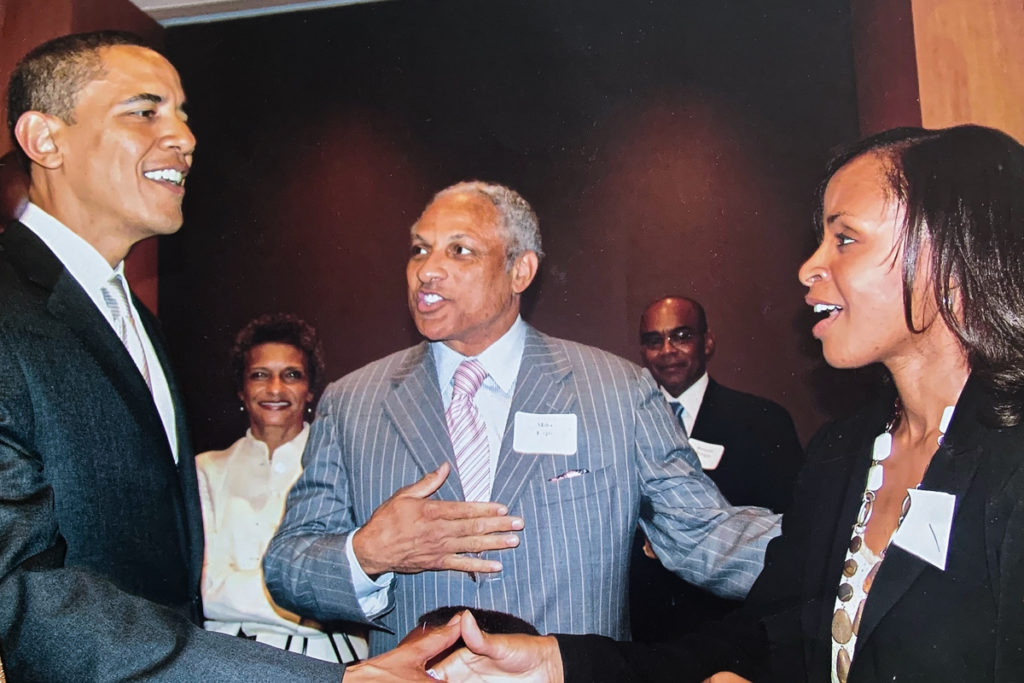
As a result, the 1890 Jim Crow provision that bars certain people with prior felony records from voting even after serving their time continues to achieve its drafters’ goals. In Mississippi, about 10% of all state residents overall are barred from voting due to felony disenfranchisement. But among Black Mississippians, 16% are disenfranchised. The law requires a literal act of the Legislature to return voting rights to those citizens, but lawmakers only approve a handful of such requests each year.
In fact, the 130,000 Black Mississippians who are permanently barred from voting is almost twice as large as the 66,000-vote-margin by which U.S. Sen. Cindy Hyde-Smith, a white Republican and segregation academy graduate, defeated opponent Mike Espy, a Black Democrat, in 2018 (after stoking a firestorm with a remark about “public hanging” that many inferred to be a reference to lynching). And it is almost triple the 45,000-vote margin by which Reeves, a Republican, defeated white Democrat Jim Hood in the 2019 governor’s race.
Despite the fact that Mississippi has more Black residents as a percent of its population than any other state, white Republicans now hold all eight top state-level offices and both U.S. Senate seats. Reeves first won election to statewide office at age 29 when he beat Democrat Gary Anderson, a Black man with decades of experience in finance, for state treasurer in 2003.
In an editorial at the time, McComb Enterprise Journal Editor Tim Kalich said Reeves’ campaign had “made sure voters hadn’t forgotten Anderson’s race, prominently featuring his opponent’s photo in an attack ad that ran in the campaign’s later stages.” In 2018 and 2020, Hyde-Smith’s campaign similarly bombarded Mississippi mailboxes with mailers featuring Espy’s visage, some painting him as a criminal.
Had he won, Espy would have been the first Black man to serve in the U.S. Senate since Blanche K. Bruce left office in 1881—a consequence of the 1890 constitutional overhaul and more than a century of policies designed to reinforce systemic racism and white supremacy and to keep real history of the Confederacy’s white-supremacist fight to maintain and extend slavery out of the history books. In fact, Confederates wanted laws to forbid the U.S. from ever ending slavery.
Blackface in Reeves and Hood’s Fraternities
Despite his claim that systemic racism is not real on Fox News, Gov. Reeves is no stranger to institutional racism. As a student at the private Millsaps College in Jackson from 1993 to 1996, he was a member of Kappa Alpha Order, a fraternity known for wearing blackface, hurling racial epithets at Black students and holding Confederate-themed balls.
In 2019, this reporter examined Millsaps yearbooks and newspapers from his time there, uncovering numerous photos showing Kappa Alpha members wearing Blackface, some in drag as Black women with afro wigs, and others with Confederate-style face paint. Reeves said he is not among the students pictured wearing blackface.

Reeves’ white 2019 Democratic opponent, Jim Hood, criticized him for speaking at a 2013 Sons of Confederate Veterans event in Vicksburg where he stood in front of a massive Confederate flag with arrangements of cotton on either side of the stage. Reeves has since signed Confederate Heritage Month proclamations on the group’s behalf in April 2020 and again in 2021, without publicly announcing the decision until after editor Donna Ladd found the documents on Confederate Facebook pages.
But Hood, who served as the state’s attorney general from 2004 until 2020, also faced his share of race-related criticisms, including on issues of systemic racism in the state’s criminal justice system like the “school-to-prison pipeline” and his handling of the Curtis Flowers case.
During the campaign for governor, Hood also came under fire in 2019 over yearbook photos showing members of his fraternity, Pi Kappa Alpha, dressed in Blackface. Like Reeves, Hood claimed he never wore Blackface. Issues of systemic racism continue to plague UM, with some wealthy donors using their influence to keep the school’s Old South traditions intact and push back against anti-racism policy initiatives.
Other Mississippi universities still celebrate the remnants of their racist past, including Mississippi State University in Starkville, whose founder, Confederate Lt. Gen. Stephen D. Lee, has a bust at the center of the university—despite his efforts to rewrite the history of the Civil War. At the University of Southern Mississippi in Hattiesburg, the football field, stadium and archives all retain the name of segregationists—including ones who fought to keep Black students from enrolling.
Last year, the Mississippi Free Press revealed how journalism school officials and UM administrators covered up a wealthy donor’s role in the Ed Meek controversy. That donor obtained an appointment to the 2019 campus chancellor search committee even after describing Black women students he had photographed as “African hookers” in an email to the dean.
The UM chancellor position had opened in late 2018 up after a number of wealthy white conservative donors pulled their funding from the school over then-Chancellor Jeff Vitter’s handling of race-related controversies, including the Meek affair. IHL controversially appointed Boyce as the school’s new chancellor in 2019.
HBCUs Underfunded Decades After Desegregation
Two years earlier, Boyce, as IHL commissioner, announced that the State would begin drawing down the allocation of millions in annual funding for Mississippi’s historically Black colleges related to a 2002 settlement.
Before 1962, when UM integrated amid a bloody clash on campus, Black Mississippians could only attend one of the state’s all-Black universities, which were chronically underfunded and remained so decades after integration. In 1975, Jake Ayers Sr., the parent of a Jackson State University student, sued over the state’s inadequate funding for the its HBCUs. The case, originally called Ayers v. Waller (referring to the governor at the time), spent decades in federal courts and became a class-action lawsuit. U.S. House Rep. Bennie Thompson, who is currently Mississippi’s only Black member of Congress, joined the plaintiffs.
The issue reached the U.S. Supreme Court in 1992 after a district court and the 5th U.S. Circuit Court of Appeals ruled that Mississippi had met its legal obligations to its HBCUs through colorblind admissions policies.
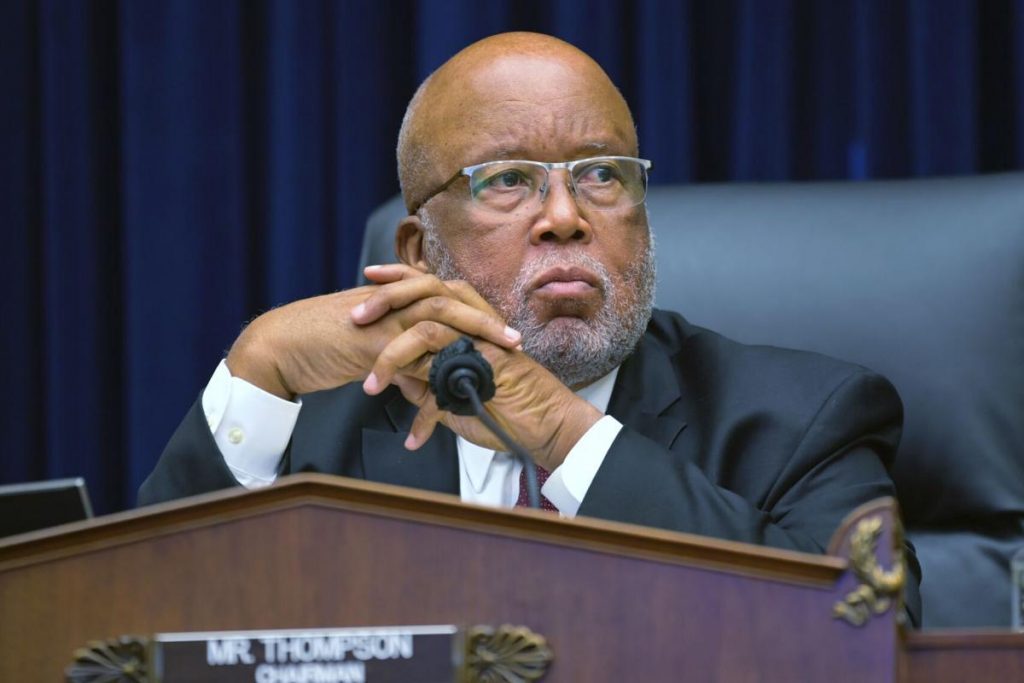
During oral arguments, U.S. Supreme Court Justice Sandra Day O’Connor posed a question to the State’s attorneys: “If the evidence established that, at least historically, the predominantly Black universities were underfunded … and if the facts showed that that was caused by state action, do you think the remedy then has to address itself to those present deficiencies that might have been caused by prior discriminatory funding?”
The State’s attorney, William F. Goodman Jr., disagreed with her premise.
“In the first place, the fact that an institution is smaller and receives less money does not mean that it is not an adequate institution,” he replied.
The U.S. Supreme Court disagreed, though, finding that systemic vestiges of segregation remained in higher education, sending the case, by then known as Ayers v. Fordice, back to lower courts for review. After almost three decades, the Ayers plaintiffs agreed to settle with the State. Mississippi would award three HBCUs $503 million over the next two decades. The settlement also included funds for new programs, facilities and endowments on the condition that the universities meet a 10% non-Black enrollment goal for three years in a row. But Ayers, the original plaintiff, never saw the case’s conclusion; he died in 1986.
Boyce said in 2017 that it would begin winding down allocations of the Ayers funds in 2018 and phase them out completely in 2022, making the future uncertain for Mississippi’s HBCUs.
“We have a system where everyone competes on equal ground. I know sometimes people don’t think it is, but that’s the way it’s designed so when those funds are gone, those funds are gone, and they have to compete,” then-Commissioner Boyce said. Two years later, as UM chancellor, he would preside as the university debated whether to keep a Confederate monument at the center of its campus.
‘Racism, It Has Very Bad Health Effects’
During a July 2020 press conference on COVID-19, a reporter asked Reeves if he had ever worn a Confederate gray uniform at one of his fraternity’s parties at Millsaps. He responded only by saying that he had attended many “costumes parties” during his time as a college student.
Moments later, Mississippi State Health Officer Dr. Thomas Dobbs responded to another question: Is there systemic racism in Mississippi’s health-care system? Yes, he said, citing the fact that the coronavirus, particularly early on, had hit Black and Native American communities far worse than any other.
“Racism, it has very bad health effects,” the Enterprise-Journal reported Dobbs saying. “It worsens cardiovascular problems and other heart issues.”

Even before the pandemic, Black Mississippians on average were less likely to have health insurance, had higher rates of known COVID-19 vulnerabilities such as heart disease and had less access to health care overall. In April 2020, the Mississippi State Department of Health reported that Black Mississippians accounted for 52% of cases and 71% of deaths. Black Mississippians were also more likely to be deemed “essential workers” and less likely to have the choice of working at home during the early lockdowns.
Over the summer, though, the pattern began to shift, with white Mississippians making up an increasing number of cases and deaths. By Oct. 14, white Mississippians comprised a majority of cases and deaths. Today, Black Mississippians make up about 40% of all cases and deaths reported since the pandemic began in March 2020—almost equal to their share of the population.
“As far as case trends, we have had pretty good uptake by a lot of folks in the Black community with masking and social distancing,” Dr. Dobbs told the Mississippi Free Press in October. “We’ve worked to make sure the Black community understands where the risks are. Big parts of the white community, especially in areas that are not heavily affected, have not been as compliant and engaged in masking and social distancing, so I think that makes a big difference.”
Dobbs Cited Systemic Issues With Vaccine Access
As the first COVID-19 vaccines arrived, surveys showed that white Mississippians were twice as likely to say they “definitely” or “probably” would not get vaccinated, despite a long history of systemic racism in health care against African Americans, including the Tuskegee vaccine experiments. But during the first few weeks of availability, Black Mississippians accounted for less than 15% of total vaccinations.
Gov. Reeves blamed the low Black vaccination rates on “a natural skepticism” informed by history. But Dobbs told the Mississippi Free Press in February that history was not the main problem. Instead, he cited systemic factors that disproportionately affected vaccine availability and delivery in the parts of the state with the largest Black populations, including a lack of internet access for information and appointment scheduling.
“We … see and believe that the access issue is a more important problem than the trust issue,” Dobbs said.
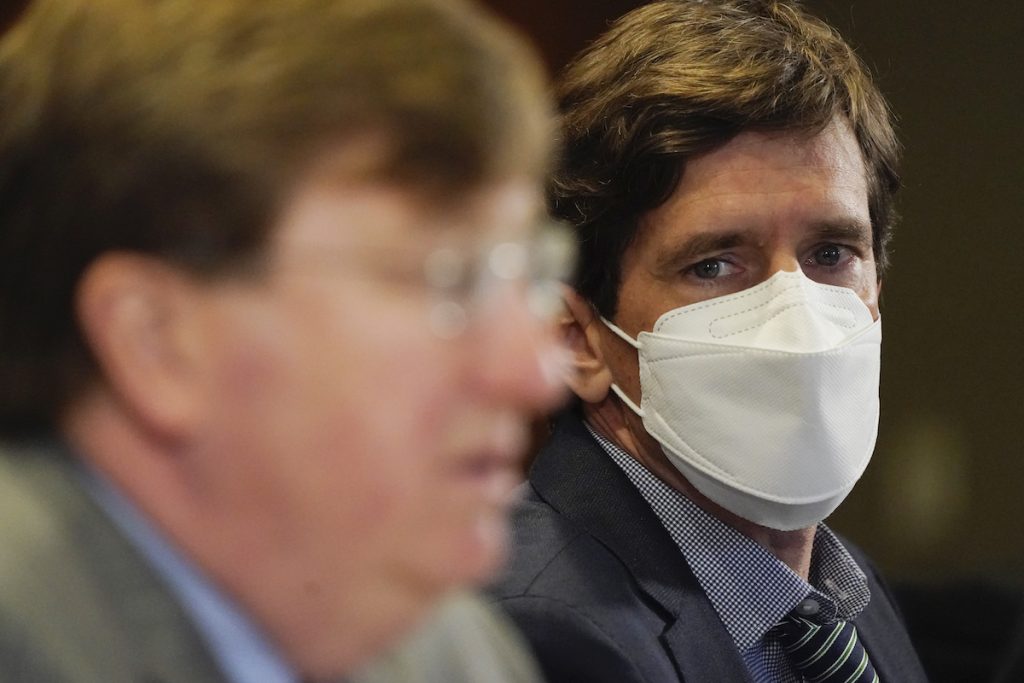
MSDH worked aggressively to correct the imbalance, partnering with Black community leaders across the state to increase the availability of vaccine information and vaccine sites across the state. The effort paid off, with Dobbs declaring in late March that “Mississippi appears to be first in the nation to reach vaccine parity for African Americans receiving Covid vaccinations.”
But asked about the state’s overall low vaccination rates in a “Good Morning America” interview in early April, Reeves continued to insist that Black Mississippians’ supposed reluctance to get vaccinated was a key issue.
“We have a very large African American population and we have a lot of rural people in our state. Both of those categories of individuals are less likely to take the (vaccine). … We’ve got to educate them and we’re working really hard to do so,” he said.
But with systemic barriers to access being addressed, Mississippi is currently 14th in terms of the share of its Black population that has been vaccinated, but only among 42 states (including the District of Columbia) that release COVID-19 vaccine data by race. Despite access disparities in the early months of vaccinations, 27% of Black Mississippians are now vaccinated compared to 30% of white Mississippians.
Associate Dean for Public Health Integration Debra Furr-Holden warned in a December op-ed that public health officials needed to make sustained efforts to ensure vaccination reached Black communities. Allowing systemic racism in health care to go unchallenged, she said, could harm the national vaccination efforts for all.
“Without a radical shift in the conversation of true COVID equity, African Americans and many others who could benefit from the vaccine will instead get sick. Some will die,” she wrote. “The rest will remain marginalized by a system and a society that hasn’t equally valued, protected, or prioritized their lives. I believe it’s time to tell the truth, the whole truth, and nothing but the truth.”
‘We Back The Blue, We Support The Police’
After Gov. Reeves denied the existence of systemic racism during Fox News’ “Red State Trailblazers Town Hall” on April 29, he declared that Americans “live in the greatest country in the history of mankind.”
Then, he implied that the Black Lives Matter protests that took place across the state last year were somehow different than those in other parts of the country.
“In Mississippi, I was proud of the fact that we had peaceful protesters but we did not have one event in which there was a riot,” Reeves said. “The reason for that is in our state that we back the blue, we support the police.”
But the thousands of Mississippians who supported the Black Lives Matter protests did not claim to “Back the Blue” (unlike many of the insurrectionists at the U.S. Capitol on January 6th who, with some waving “Thin Blue Line” flags, left more than 100 Capitol Police Officers injured and one dead). Instead, the Black Lives Matter protesters were, in many cases, specifically protesting systemic racism—including in policing.
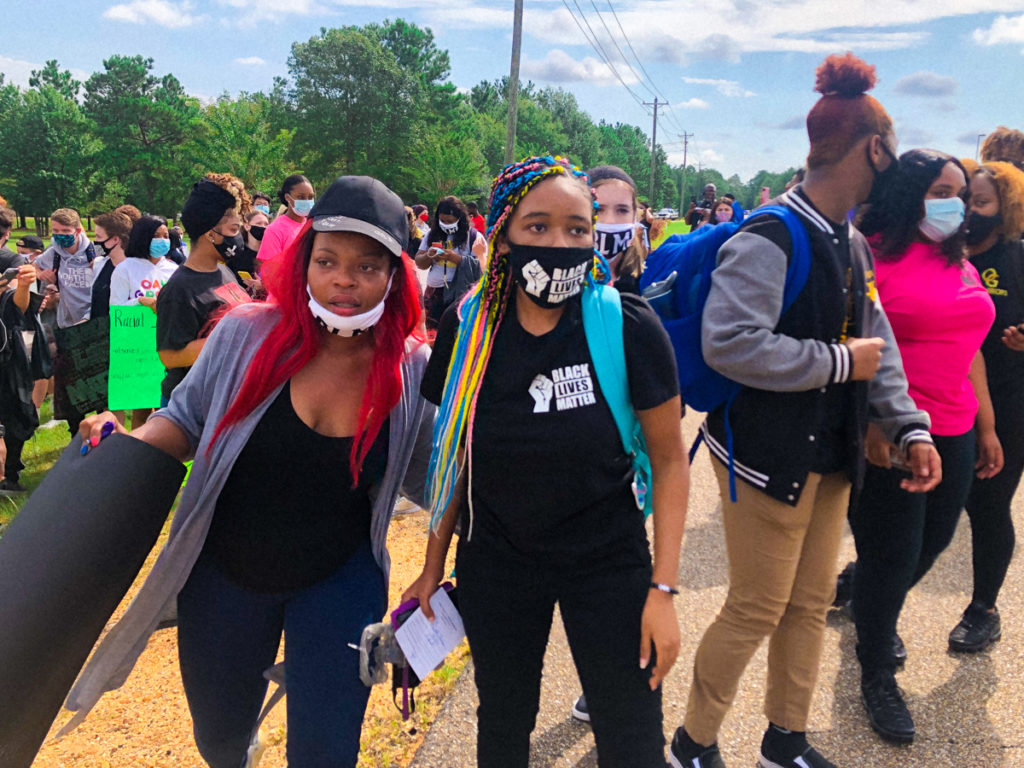
Despite his recent praise for Mississippi protesters, when the Black Lives Matter protests were ongoing last summer though, Reeves repeatedly criticized them. Though Dr. Dobbs said MSDH had not identified any cases stemming from the protests, Reeves blamed the mostly masked marchers for the summer spike in COVID-19 cases.
Then, on Aug. 11, 2020, he suggested in a tweet that high rates of gun ownership in Mississippi explain the lack of “riots” in the state—and that guns could prevent Black Lives Matter protesters from getting out of hand.
“Watching violence spike in other parts of the country makes me very grateful for Mississippi’s firm commitment to the 2nd Amendment. The way to prevent lawlessness is widespread citizen protection,” he wrote. “Don’t defund the police and stop civilian gun ownership—riots could be the result.”
One study found that 93% of Black Lives Matter protests in 2020 were peaceful. When violence did break out, it often followed violent provocation from law enforcement. Last June in Washington, D.C., U.S. Park Police and National Guard troops used tear gas on peaceful Black Lives Matter protestors to clear the way for President Trump to march to a church.
“We have the greatest country in the world. Keep it nice and safe,” Trump said, holding up a Bible after non-violent protesters had scattered amid the spray of chemical agents.
Last summer in Oak Grove, a suburb of Hattiesburg, dozens of Oak Grove High students walked out of class to protest racism among peers and teachers—a demonstration ignited after white students ran out on the football field during a senior class event, one carrying a “Thin Blue Line” flag, and another yelling, “White Power.”
During the protest, the students gathered around Christopher Preston, a Black pastor, as he explained the importance of the words, “Black lives matter.”
“Don’t let anybody make you feel bad about saying Black lives matter. Anybody who hears, ‘Only Black lives matter’ when you say Black Lives Matter is someone who really has an issue with the reality that black lives matter,” he said. “It’s not the phrase that bothers them. It’s the reality or the nerve you have to say it to (their) face: ‘Black Lives Matter.’
“Because all of their life, they’ve been trained that, if they see a Black man on the ground with the policeman’s knee on his neck, he must’ve done something wrong. … So you’ve got to understand that when you say Black Lives Matter, you cause angst because now you’re forcing people to see a group of people that they’ve been taught and culturally conditioned to never see and acknowledge.”
‘America Is A Great Place’
Near the end of Fox News’ “Red State Trailblazers Town Hall” with Reeves and other Republican governors on April 29, Laura Ingraham, the host, asked him a final question regarding what he believes children in America should learn in school.
Late last year, Reeves endorsed teaching “patriotic education,” even as Trump appointed his predecessor, Phil Bryant, to a presidential commission that designed a national proposal for a patriotic education commission.
The report that the since-disbanded commission delivered suggested teaching a whitewashed version of U.S. history that de-emphasized its racist foundings—much as post-Reconstruction textbooks in Mississippi rewrote the history of the Civil War as a battle over “state’s rights” instead of slavery.
“Governor Reeves, when you look at the economies of all your states …, and then you hear people have such a negative view of America, whether it’s on the race question or any other question we heard the president talk about last night, kids today, what do they need to learn first and foremost in our public schools about this country,” Ingraham asked Reeves on April 29.
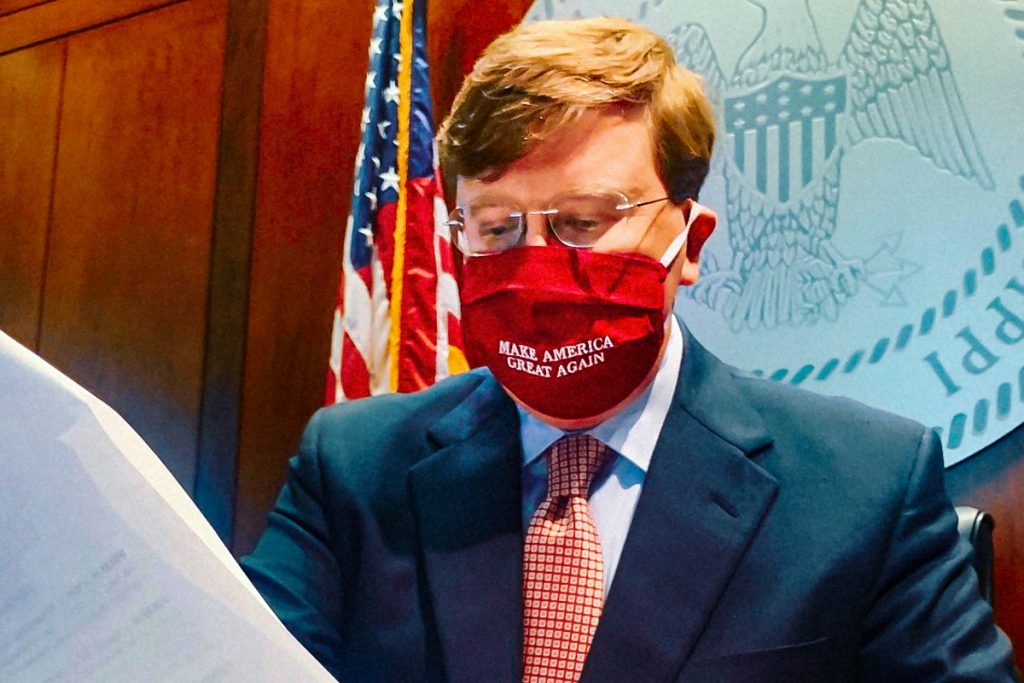
“Well, it seems like many people in the Democrat(ic) Party—and it’s not just the far left, it’s many people in the Democrat(ic) Party—are putting down American day in and day out,” Reeves said.
During his address to Congress, Biden repudiated anti-trans laws—like the one Reeves signed into law in March effectively barring most transgender high school and college students from participating in sports.
“To all transgender Americans watching at home, especially the young people. You’re so brave. I want you to know your president has your back,” Biden said.
The president also called the rise of white supremacy, like groups tied to the deadly 2017 United the Right event in Charlottesville, Va., and the Jan. 6 insurrection, “the most lethal terrorist threat to the homeland today.” And though he vowed not to raise taxes on anyone making less than $400,000, Biden argued for rolling back Trump’s tax cuts on the rich, who are disproportionately white, to fund child care and expanded education opportunities.
The Mississippi governor told Ingraham that Biden’s proposals threaten Americans’ opportunities.
“It’s almost as if they want to act as if there is not such a thing as the American dream,” said Reeves, a wealthy white man who was born to the founder of a multi-million dollar company, owns a home in a gated community and sends his children to a 93% white private prep school in Jackson where annual tuition exceeds $15,000.
“And they are absolutely wrong. America is a great place.”






